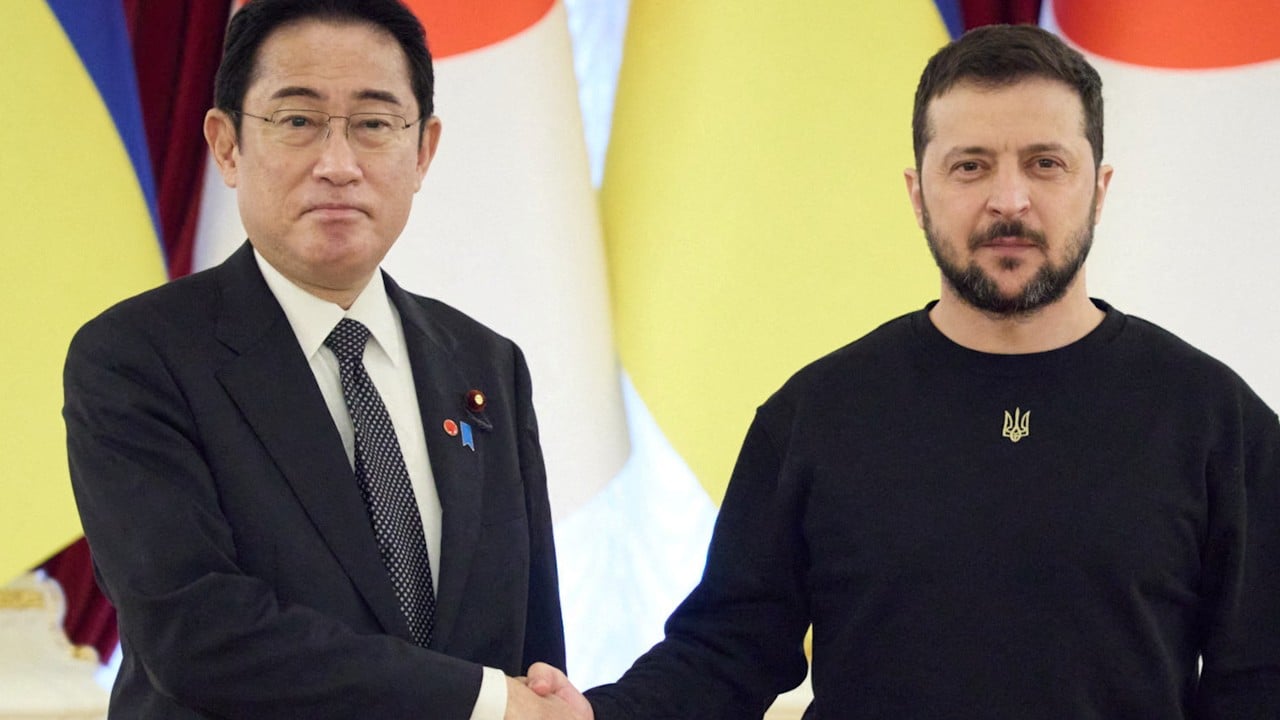
Japan PM Fumio Kishida’s ‘necessary’ surprise visit to Kyiv receives strong domestic support ahead of G7 Summit
- Kishida is the last leader of the G7 nations to visit Kyiv since the war began, and the trip comes ahead of Japan hosting the G7 summit in May
- Analysts say Japan is unlikely to send weapons to Ukraine, even as it promises more financial aid and non-lethal military equipment including supplies
The Japanese Prime Minister Fumio Kishida’s surprise visit to Ukraine this week has received broad-based domestic support, with observers saying the trip was a “necessary step” before the world’s third largest economy hosts the Group of Seven (G7) summit next month.

There are reports that Kishida has long wanted to visit Kyiv and plans were in place on at least two occasions last year but ultimately fell through.
“With the summit coming up, it was getting a bit embarrassing,” Brown told This Week in Asia, adding that far more came out of the visit than most analysts expected.
Analysts point out that other allied nations recognise that Japan has unique political circumstances to take into account – primarily the constraints imposed by its pacificist constitution – and there has been little criticism of Tokyo’s policies on assistance to Kyiv, including from the Ukrainian government.
Kishida said Japan will also help Ukraine to upgrade its energy security and enhance bilateral ties to a “special global partnership”.
“This is quite a big step for Japan and I expect that in the future there will be promises of even more non-lethal equipment,” Brown said. “And while Ukraine clearly needs more arms and ammunition, this is a huge amount of additional support that is also required.”
Domestic support
At home, Kishida has the backing of the electorate and the Diet. There may be “pockets of more hawkish members” of his ruling Liberal Democratic Party who push for more offensive weapons to be sent to Kyiv, “but Kishida won’t take that step because it doesn’t fit his character as a more dovish figure”, said Brown.
There may also be some politicians who grumble that the money spent to support Ukraine would be better spent solving some of Japan’s domestic issues and the nation would be better off staying out of the entire Ukraine crisis, he added, but those attitudes are very much a minority.

The paper added that Japan must continue to adhere to its long-held “Three Principles [on Arms Exports]” that regulate the transfer of military equipment and technology, and “draw upon its experiences and know-how as a nation that has embraced pacificism since the end of World War II”.
The conservative Yomiuri newspaper on the same day also printed a rare editorial that concurred with the Asahi’s position, declaring that “Japan should make every possible effort to stop Russia’s outrageous acts”.
Yakov Zinberg, a professor of international relations at Tokyo’s Kokushikan University, said Kishida was almost certainly pressured by G7 members to visit Kyiv ahead of the Hiroshima summit in May, to emphasise the group’s united stand on Ukraine.
“I expect a lot of collective pressure was brought to bear and he was not going there empty-handed, so it was an important message,” he said. “And I am equally sure that this will not be the end of the aid that Japan provides, although I do agree that Kishida will not be able to provide weapons.”

Zinberg pointed out that Japan this month attempted to keep open lines of communication with Moscow over access by former residents to disputed islands off northern Japan.
But there has been no public reaction in Russia to Japan’s proposal, and Zinberg said the offer is unlikely to be taken up now that Kishida has travelled to Kyiv. Zinberg, who was born in St Petersburg, said Russian news coverage of the Japanese leader’s trip has been “very critical and very angry”.
Russia deployed two strategic bombers over the Sea of Japan on the same day that Kishida was in Kyiv, a deployment that Brown suggested was “not a coincidence”.
“But Sakhalin provides Russia with an opportunity to retaliate against Japan by halting exports and showing that Moscow is very displeased at Kishida’s show of support for Ukraine,” he added.


